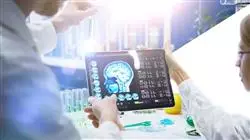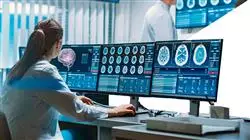University certificate
The world's largest faculty of medicine”
Introduction to the Program
A 100% online syllabus that allows you, through case studies, to delve into the most disruptive diagnostic functions of AI tools"

Emerging technologies in the healthcare field have opened new horizons for addressing conditions such as Cancer, Alzheimer's or Diabetes. These cutting-edge tools improve diagnostic accuracy while helping to identify the most appropriate treatment options for patients based on their genetic profile, medical history or demographics. In this way, specialists focus their work on the design of personalized therapies to achieve more effective results and minimize the side effects they may entail. However, to achieve this, physicians need to constantly update their knowledge in order to apply the most innovative procedures in their clinical practice.
To respond to this need, TECH has implemented a Postgraduate certificate that covers the applications of Artificial Intelligence (AI) in the healthcare context. Designed by real experts in the field, the syllabus includes from the integration of multimodal clinical data to the development of datasets and management of the information obtained. The syllabus also delves into the process of evaluating diagnostic models assisted by Intelligent Automation. In addition, the physician can analyze real clinical cases and evaluate effective care strategies. In this way, the graduates of this program achieve an exhaustive mastery of the challenges related to these medical innovations, enabling them to achieve excellent healthcare practice.
The 100% online educational experience of this Postgraduate certificate provides professionals with the flexibility to take it at the place and time of their choice. This university program does not include pre-established schedules or face-to-face classes, avoiding unnecessary trips to a study center. To complete this academic itinerary, all you need is a device with an Internet connection. On the other hand, TECH is characterized by an innovative learning methodology: Relearning. This teaching method involves the repetition of key concepts to ensure optimal assimilation of the contents in a natural and progressive way.
You will process natural language on medical records to make the most accurate clinical diagnoses after completing this 6-week program"
This Postgraduate certificate in Artificial Intelligence-Enhanced Clinical Diagnostics contains the most complete and up-to-date scientific program on the market. Its most outstanding features are:
- The development of case studies presented by experts in Artificial Intelligence in Clinical Practice
- The graphic, schematic, and practical content with which they are created, provide scientific and practical information on the disciplines that are essential for professional practice.
- Practical exercises where the self-assessment process can be carried out to improve learning
- Its special emphasis on innovative methodologies
- Theoretical lessons, questions to the expert, debate forums on controversial topics, and individual reflection assignments
- Content that is accessible from any fixed or portable device with an Internet connection
Thanks to the innovative Relearning methodology, of which TECHis a pioneer, you will integrate all the knowledge in an optimal way to successfully achieve the results you are looking for"
The program’s teaching staff includes professionals from the sector who contribute their work experience to this training program, as well as renowned specialists from leading societies and prestigious universities.
The multimedia content, developed with the latest educational technology, will provide the professional with situated and contextual learning, i.e., a simulated environment that will provide immersive education programmed to learn in real situations.
This program is designed around Problem-Based Learning, whereby the professional must try to solve the different professional practice situations that arise during the academic year For this purpose, the students will be assisted by an innovative interactive video system created by renowned and experienced experts.
You will create datasets that will help you to discover risk factors and develop new therapeutic treatments through this program"

Do you want to specialize in the interpretation of medical images through Intelligent Automation? Achieve it through this exclusive syllabus"
Why study at TECH?
TECH is the world’s largest online university. With an impressive catalog of more than 14,000 university programs available in 11 languages, it is positioned as a leader in employability, with a 99% job placement rate. In addition, it relies on an enormous faculty of more than 6,000 professors of the highest international renown.

Study at the world's largest online university and guarantee your professional success. The future starts at TECH”
The world’s best online university according to FORBES
The prestigious Forbes magazine, specialized in business and finance, has highlighted TECH as “the world's best online university” This is what they have recently stated in an article in their digital edition in which they echo the success story of this institution, “thanks to the academic offer it provides, the selection of its teaching staff, and an innovative learning method aimed at educating the professionals of the future”
A revolutionary study method, a cutting-edge faculty and a practical focus: the key to TECH's success.
The most complete study plans on the university scene
TECH offers the most complete study plans on the university scene, with syllabuses that cover fundamental concepts and, at the same time, the main scientific advances in their specific scientific areas. In addition, these programs are continuously being updated to guarantee students the academic vanguard and the most in-demand professional skills. In this way, the university's qualifications provide its graduates with a significant advantage to propel their careers to success.
TECH offers the most comprehensive and intensive study plans on the current university scene.
A world-class teaching staff
TECH's teaching staff is made up of more than 6,000 professors with the highest international recognition. Professors, researchers and top executives of multinational companies, including Isaiah Covington, performance coach of the Boston Celtics; Magda Romanska, principal investigator at Harvard MetaLAB; Ignacio Wistumba, chairman of the department of translational molecular pathology at MD Anderson Cancer Center; and D.W. Pine, creative director of TIME magazine, among others.
Internationally renowned experts, specialized in different branches of Health, Technology, Communication and Business, form part of the TECH faculty.
A unique learning method
TECH is the first university to use Relearning in all its programs. It is the best online learning methodology, accredited with international teaching quality certifications, provided by prestigious educational agencies. In addition, this disruptive educational model is complemented with the “Case Method”, thereby setting up a unique online teaching strategy. Innovative teaching resources are also implemented, including detailed videos, infographics and interactive summaries.
TECH combines Relearning and the Case Method in all its university programs to guarantee excellent theoretical and practical learning, studying whenever and wherever you want.
The world's largest online university
TECH is the world’s largest online university. We are the largest educational institution, with the best and widest online educational catalog, one hundred percent online and covering the vast majority of areas of knowledge. We offer a large selection of our own degrees and accredited online undergraduate and postgraduate degrees. In total, more than 14,000 university degrees, in eleven different languages, make us the largest educational largest in the world.
TECH has the world's most extensive catalog of academic and official programs, available in more than 11 languages.
Google Premier Partner
The American technology giant has awarded TECH the Google Google Premier Partner badge. This award, which is only available to 3% of the world's companies, highlights the efficient, flexible and tailored experience that this university provides to students. The recognition as a Google Premier Partner not only accredits the maximum rigor, performance and investment in TECH's digital infrastructures, but also places this university as one of the world's leading technology companies.
Google has positioned TECH in the top 3% of the world's most important technology companies by awarding it its Google Premier Partner badge.
The official online university of the NBA
TECH is the official online university of the NBA. Thanks to our agreement with the biggest league in basketball, we offer our students exclusive university programs, as well as a wide variety of educational resources focused on the business of the league and other areas of the sports industry. Each program is made up of a uniquely designed syllabus and features exceptional guest hosts: professionals with a distinguished sports background who will offer their expertise on the most relevant topics.
TECH has been selected by the NBA, the world's top basketball league, as its official online university.
The top-rated university by its students
Students have positioned TECH as the world's top-rated university on the main review websites, with a highest rating of 4.9 out of 5, obtained from more than 1,000 reviews. These results consolidate TECH as the benchmark university institution at an international level, reflecting the excellence and positive impact of its educational model.” reflecting the excellence and positive impact of its educational model.”
TECH is the world’s top-rated university by its students.
Leaders in employability
TECH has managed to become the leading university in employability. 99% of its students obtain jobs in the academic field they have studied, within one year of completing any of the university's programs. A similar number achieve immediate career enhancement. All this thanks to a study methodology that bases its effectiveness on the acquisition of practical skills, which are absolutely necessary for professional development.
99% of TECH graduates find a job within a year of completing their studies.
Postgraduate Certificate in Artificial Intelligence-Enhanced Clinical Diagnostics
At the epicenter of medical evolution, Artificial Intelligence-Enhanced Clinical Diagnostics stands as a beacon of innovation, transforming the way healthcare professionals approach the diagnosis and treatment of diseases. Based on this, TECH Global University presents its Postgraduate Certificate in Artificial Intelligence-Enhanced Clinical Diagnostics, an innovative program that will provide you with the necessary foundations to become an expert. Begin your journey by gaining a deep understanding of the fundamentals of Artificial Intelligence-Enhanced Clinical Diagnostics. You will explore how advanced algorithms can improve medical image interpretation, data analysis and clinical decision support. In addition, you will learn how to effectively integrate AI technology into clinical settings. From optimizing workflows to interpreting analytical results, this course will give you the skills you need to effectively incorporate AI into your daily medical practice. All this, you will learn without having to leave home, with the best teaching tutorials and interactive material that will give that rewarding plus to your professional profile.
Get qualified at the largest online School of Medicine
Get ready to lead the revolution in clinical diagnostics with our Postgraduate Certificate. Here, you'll discover how artificial intelligence is transforming medical practice and acquire the skills you need to excel in the future of healthcare. The syllabus, designed by a team of highly qualified teachers, features the most up-to-date concepts on the market and the latest online teaching methods. In this way, you will be immersed in medical image analysis with advanced AI tools. You will discover how technology can enhance early disease detection, identify patterns and improve diagnostic accuracy in disciplines such as radiology and pathology. In addition, you will keep abreast of the latest trends in AI-enhanced clinical diagnostics. All in all, this course will provide you with an up-to-date perspective on innovations in the field, ensuring you are equipped to address the evolving challenges of modern medicine. Make the decision and enroll now. Your path to excellence starts here!







